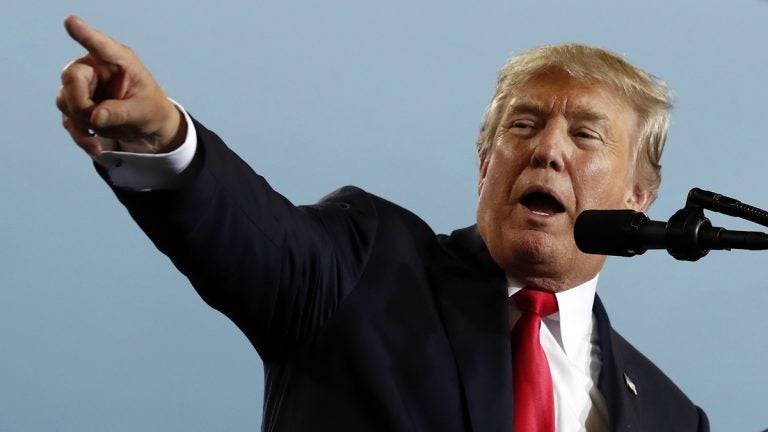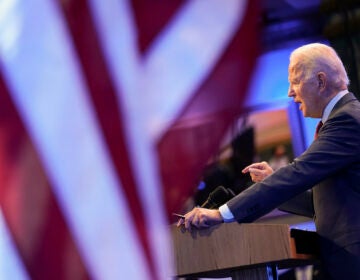Trump seeks end to health care penalty in House GOP tax bill
President Donald Trump is pressuring Republicans to repeal a health care law penalty in their tax rewrite.

President Donald Trump speaks about tax reform during an event at the Harrisburg International Airport, Wednesday, Oct. 11, 2017, in Middletown, Pa. (Alex Brandon/AP Photo)
President Donald Trump is pressuring Republicans to repeal a health care law penalty in their tax rewrite, a step the House’s top tax writer indicated is politically problematic.
Rep. Kevin Brady, chairman of the Ways and Means Committee, said Friday the president had spoken to him twice by phone and once in person, imploring him to scrap the so-called individual mandate that requires Americans to obtain health insurance or face a penalty.
“The president feels quite strongly about including this at some step,” Brady said in an interview with Politico.
The Congressional Budget Office has estimated that repealing the individual mandate would save $416 billion over a decade. That’s because without it, fewer people would enroll in Medicaid or buy federally subsidized coverage on insurance exchanges. The money represents a tempting revenue source for GOP tax writers whose plan for extensive tax cuts would add an estimated $1.5 trillion to the nation’s debt over 10 years.
Trump and the Republicans are driving to push through a major tax-cutting bill this year to secure a legislative accomplishment, following their stinging failure to overturn and replace the Obama health care law. As a party, the Republicans face increasing pressure to produce a marquee legislative victory before next year’s elections.
An influential conservative lawmaker, Rep. Mark Meadows, R-N.C., said Friday that repealing the health care mandate needs to be part of the tax bill. He said he believes a majority of Republicans in the House share that view.
Trump even tweeted on Wednesday: “Wouldn’t it be great to Repeal the very unfair and unpopular Individual Mandate in ObamaCare and use those savings for further Tax Cuts for the Middle Class.”
But Brady pointed out the Senate has been unable to muster enough votes for any health care legislation.
“There are pros and cons to this. Importing health care into a tax reform debate does have consequences,” he said.
And Rep. Tom Cole, R-Okla., said, “I think the attitude is let’s not mix up health care with this.”
Republicans have set an ambitious timetable for the first revamp of the nation’s tax code in three decades, one that would touch virtually all Americans and the economy’s every corner, mingling sharply lower rates for corporations and reduced personal taxes for many with fewer deductions for home-buyers and families with steep medical bills.
Brady called it “a challenge of a lifetime legislatively.”
Under the plan, the bulk of the tax cuts go to businesses instead of individuals, according to a budget watchdog group. The Washington-based Committee for a Responsible Federal Budget says corporations and other businesses get tax cuts of about $1 trillion, with the rest for individuals and people inheriting multimillion-dollar estates.
GOP leaders praised the plan as a sparkplug for the economy and a boon to the middle class and christened it the Tax Cuts and Jobs Act.
It would also increase the national debt, a problem for some Republicans. And Democrats attacked the proposal as the GOP’s latest bonanza for the rich, with a phase-out of the inheritance tax and repeal of the alternative minimum tax on the highest earners — certain to help Trump and members of his family and Cabinet, among others.
And there was enough discontent among Republicans and business groups to leave the legislation’s fate uncertain in a journey through Congress that leaders hope will deposit a landmark bill on Trump’s desk by year’s end.
Underscoring problems ahead, some Republicans from high-tax Northeastern states expressed opposition to the measure’s elimination of the deduction for state and local income taxes. Senate Finance Committee Chairman Orrin Hatch of Utah called the House measure “a great starting point” but said it would be “somewhat miraculous” if its corporate tax rate reduction to 20 percent — a major Trump goal — survived. His panel plans to produce its own tax package in the coming days.
The package’s tax reductions would outweigh its loophole closers by a massive $1.5 trillion over the coming decade. Many Republicans were willing to add that to the nation’s soaring debt as a price for claiming a resounding tax victory. But it was likely to pose a problem for others — one of several brushfires leaders will need to extinguish to get the measure through Congress.
Republicans must keep their plan’s shortfall from spilling over that $1.5 trillion line or the measure will lose its protection against Democratic Senate filibusters, bill-killing delays that take 60 votes to overcome. There are just 52 GOP senators, and unanimous Democratic opposition is likely.
The bill would telescope today’s seven personal income tax brackets into just four: 12 percent, 25 percent, 35 percent and 39.6 percent.
- The 25 percent rate would start at $45,000 for individuals and $90,000 for married couples.
- The 35 percent rate would apply to family income exceeding $260,000 and individual income over $200,000, which means many upper-income families whose top rate is currently 33 percent would face higher taxes.
- The top rate threshold, now $418,400 for individuals and $470,700 for couples, would rise to $500,000 and $1 million.
The standard deduction — used by people who don’t itemize, around two-thirds of taxpayers — would nearly double to $12,000 for individuals and $24,000 for couples. That’s expected to encourage even more people to use the standard deduction with a simplified tax form Republicans say will be postcard-sized.
WHYY is your source for fact-based, in-depth journalism and information. As a nonprofit organization, we rely on financial support from readers like you. Please give today.




